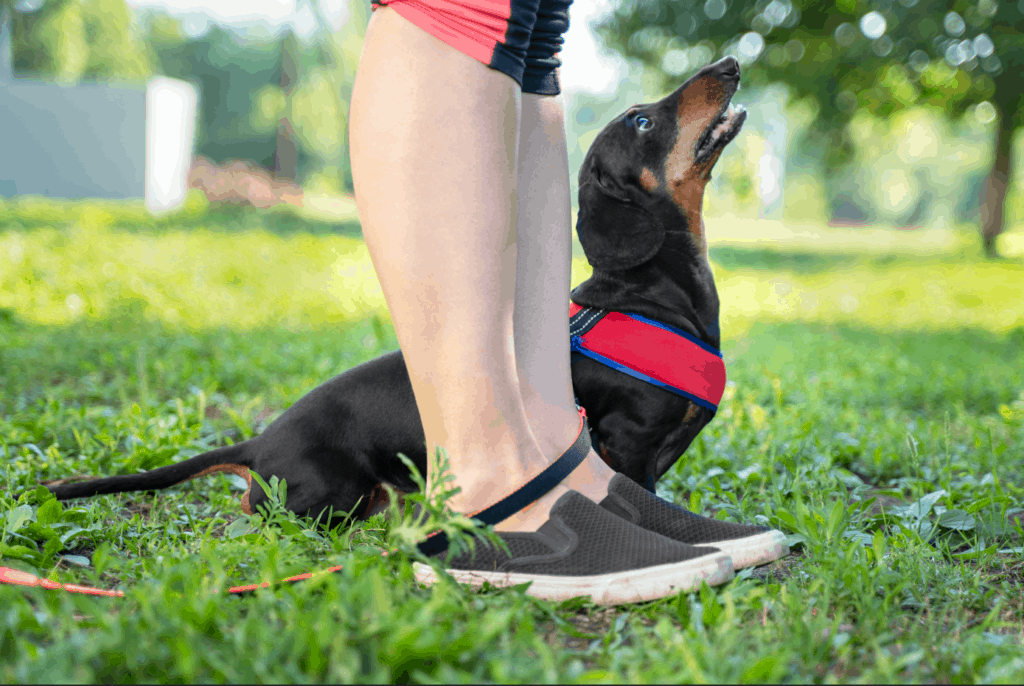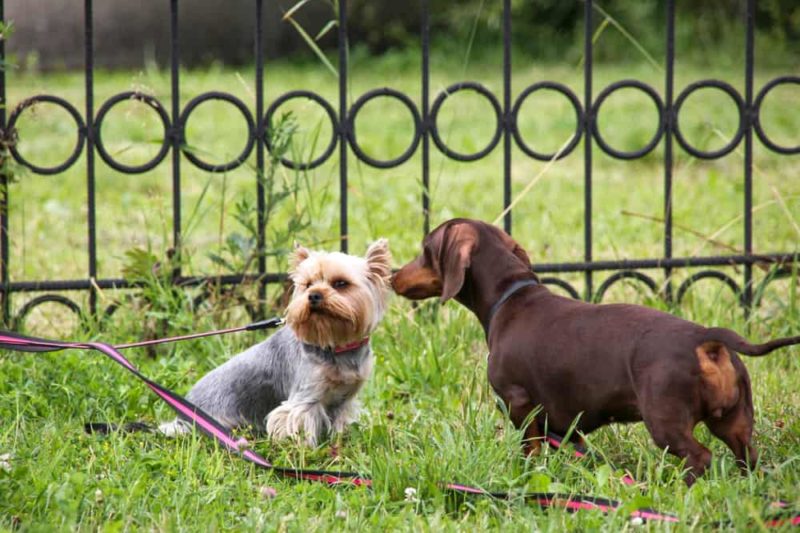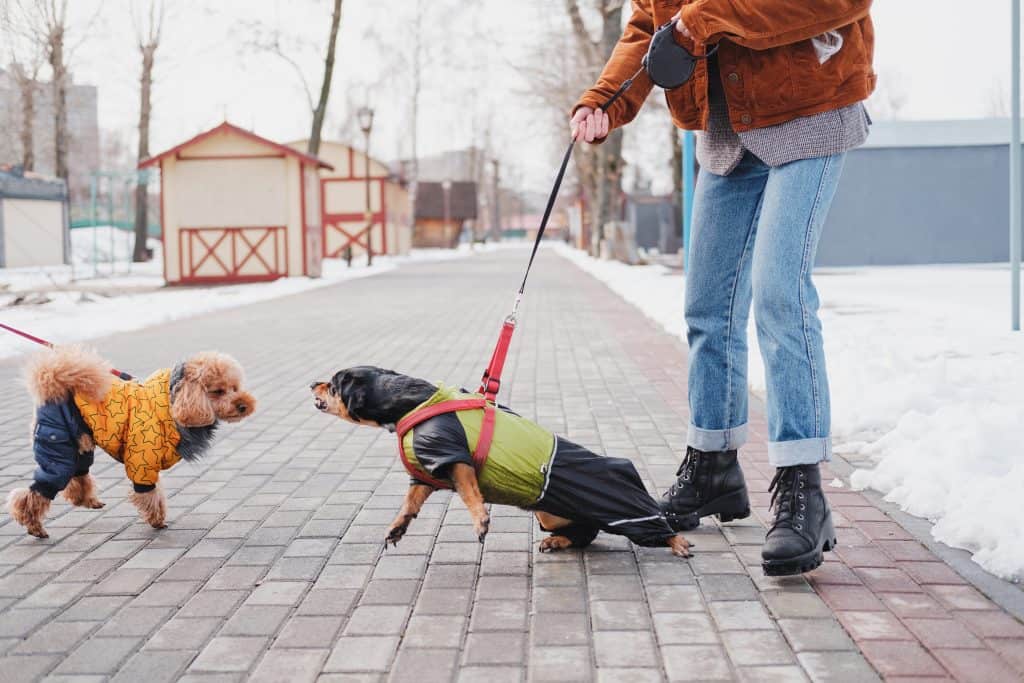
Are you determined to be the exemplary dachshund owner? If so, training your little companion is essential. With a bit of effort and the correct approach, even the most obstinate pup can learn obedience! In this blog post, we will provide expert advice for successfully training your pooch.
Train Your Dachshund Like a Pro: Expert Tips for a Well-Mannered Pet
If you own a dachshund, you know that these small, long-bodied dogs are full of personality and energy. With their lively and affectionate nature, it’s easy to see why they are a beloved breed. However, dachshunds can also be stubborn and difficult to train, which is why their owners must understand how to effectively train them.
Is training important for dachshunds?
Dachshunds are famously recognized for their ardent hunting drive and stubborn spirit, as they were initially bred in Germany to chase small game such as badgers and rabbits. Despite being incredibly smart, Dachshunds can be difficult to train if the wrong teaching style is used; hence, proper training methods must be adopted when you bring a new pup home. An appropriate amount of discipline will go a long way with these independent pups!
Training is an essential part of dachshund ownership; it forms a strong bond between you and your furry companion, helps maintain obedience and good behavior, and averts destruction or aggression. Even if you have been around the block with doxies before, understanding how to train them effectively ensures that both you and your pup will have a long-lasting relationship filled with joy. A well-trained dachshund is always a pleasure to be with!
Related post: How do I stop my Dachshund from being aggressive?
Are dachshunds difficult to train?
Dachshunds are known for their cleverness; yet, that same intelligence often presents a difficulty when it comes to training them. Unlike other dog breeds, which may desire to please their owners by doing as they are asked, the Dachshund has its agenda and will strive only for what best serves itself.
Nonetheless, do not let this deter you; training a Dachshund is far from impossible. To effectively train a Dachshund, it is important to understand its unique personality traits, instincts, and behavior patterns.
Are dachshunds a difficult breed?
Many people may be familiar with the Dachshund’s reputation for independence and obstinacy, yet these furry friends have a softer side as well. They are clever, devoted pups that love to shower affection – once you’ve figured out what makes them tick!
Proper training is essential when it comes to doting on your Dachshund; successful techniques must recognize each pup’s unique character traits to achieve optimal results.
Training your pup can be quite a task, considering their inclination to chase prey, dig excessively, and bark nonstop. Not to mention the separation anxiety they experience when left alone! But if you have an understanding of their behavior patterns, it will be easier to address these issues.
Related post: How To Stop a Dachshund From Barking

What type of training do dachshunds need?
Basic commands such as sit, stay, and come
Establishing a strong foundation for your training is essential, and the basic commands of “sit,” “stay,” and “come” are indispensable tools to help you achieve that.
Tricks such as rolling over and shake
Not only are tricks like “roll over” and “shake” enjoyable, but they also play an essential role in forming trust between you and your Dachshund, thus cultivating a stronger bond.
Potty Training
Potty-training your dachshund is not only a crucial step in maintaining a clean and healthy home, but it also can foster feelings of safety and security for them.
Related post: Why Is My Dachshund Peeing Everywhere?
Leash Training
Properly training your dachshund on a leash is a crucial part of raising them. Not only does it keep them safe when outdoors, but it also helps to foster an unbreakable bond between you and your pup!
Socialization
Socializing your dachshund is an essential part of their training, as it not only helps them to develop beneficial relationships with other people and pets but also reduces the likelihood of them suffering from fear or anxiety.
Related post: How do I stop my dachshund puppy from biting?
Correcting Behavioral Issues
Dachshunds, like any breed, can exhibit behavioral issues that require additional attention and training. Common behavioral issues with Dachshunds include barking, digging, and separation anxiety. Understanding the root causes of these behaviors can help one address them effectively.
Related post: Leaving your dachshund home alone

How to train a dachshund
Training a Dachshund puppy is an involved process that requires your steadfast dedication, patience, and consistency. Results may not appear immediately; however, if you continue with the correct methods of training while maintaining a positive attitude, success will be yours!
If you’re looking to train your Dachshund, the first step is selecting a suitable approach. Positive reinforcement has proven to be one of the most effective ways for training Dachshunds, as it rewards good behavior with treats, compliments, and affection; all of which motivates them to replicate this positive action!
Positive reinforcement training is based on an age-old concept: rewarding a behavior will make it more likely to happen again.
Related post: Are Dachshunds Easy to Train?
Teaching your dachshund basic commands
Ready to begin obedience training your new Dachshund puppy? Start with the essential commands like “sit,” “stay,” and “come.” Don’t know where to start? Here’s a step-by-step guide on how to train your pup for these key commands:
- “Sit”: Hold a treat above your puppy’s head, and as they follow the treat with their eyes, slowly move it back towards their tail. This will cause them to naturally lower their hindquarters into a sitting position. When they sit, say “Sit” and give them the treat.
- “Stay”: Once your puppy has learned the “sit” command, you can begin teaching them to “stay.” Start by having your puppy sit, and then hold your hand up as if you were giving them a “stop” signal. Say “Stay,” and take a step back. If they stay in the sitting position, give them a treat.
- “Come”: To teach your puppy to come, start by calling their name and saying “come” in a friendly, upbeat tone. When they come to you, reward them with a treat and lots of praise.
Advanced Tricks and Behaviors
With a few basic commands under your belt, you and your Dachshund pup can move on to more sophisticated tricks. Here’s where the fun starts! Let these ideas get you inspired:
- Roll Over: Start by having your puppy lie down. Hold a treat close to its nose and slowly move it towards its shoulder. This will cause it to roll onto its side. When it rolls over, say “roll over” and give it the treat.
- Fetch: Start by tossing a toy a short distance away from your puppy. Encourage them to go get it and bring it back to you. When they bring the toy back, say “fetch” and reward them with a treat.
Here is a helpful video that shows you how to teach your dachshund tricks.
How to potty train a dachshund puppy
Potty training a dachshund pup can be tedious and difficult, but the right attitude combined with some time and effort will equip you to successfully teach your pup to go outdoors. In this comprehensive guide, we’ll provide all of the information necessary for potty training a dachshund puppy!
- Create a Potty Training Routine: Establishing a consistent routine is crucial for potty training your dachshund puppy. Set up a regular feeding and watering schedule, and take your puppy outside to the same spot each time you want them to do their business; this will help your puppy understand when it is time to go potty.
- Reward Your Puppy for Good Behavior: Positive reinforcement is key to potty training your Dachshund puppy. Whenever your puppy successfully goes potty outside, reward them with treats, praise, or affection. This will encourage them to repeat the behavior and associate going potty outside with a positive experience.
- Use a Crate for Training: Using a crate is an effective way to train your Dachshund puppy to hold its bladder and avoid accidents inside the house. Make sure the crate is large enough for your puppy to stand up, turn around, and lie down comfortably.
- Supervise Your Puppy: It is important to supervise your dachshund puppy at all times during the potty-training process. This will help you to catch any accidents before they happen and redirect your puppy to the appropriate spot.
- Clean Up Accidents Properly: Although accidents are inevitable during toilet training, it is vital to eliminate any scents that may attract your pup back to the same area. To do this effectively, use an enzymatic cleaner for a complete and thorough clean-up.
- Be Patient and Consistent: Remember, potty-training a dachshund puppy takes time and patience. Be consistent in your training efforts and celebrate every success along the way.
Related post: How to Potty Train a Dachshund Puppy
How to leash train a dachshund:
Leash training your dachshund pup can be tough, however, with unwavering commitment and persistence, it can be a mutually beneficial experience for both you and your cute canine companion. Below are some helpful steps to get started on this rewarding journey:
- Start by getting your Dachshund puppy used to the collar and leash. Let them wear the collar around the house for short periods, and attach the leash for a few minutes at a time while giving them treats and praising them.
- Begin the training in a quiet, distraction-free area. Encourage your puppy to come toward you with treats and use a happy, high-pitched voice. When they come to you, reward them with treats and praise.
- Once your puppy is comfortable with the collar and leash, start walking with them. Use positive reinforcement to encourage them to walk beside you. Hold the leash in one hand and a treat in the other, and encourage your puppy to walk beside you by using the treat as a lure. Be sure to reward them with treats and praise when they are walking properly.
- If your dachshund puppy pulls on the leash, stop walking and wait until it stops pulling. When it stops pulling, reward it with treats and praise. Gradually increase the distance and time you spend walking with your puppy.
- Remember to keep the training sessions short, as puppies have short attention spans. Aim for 10- to 15-minute sessions, several times a day.
- Stay positive and patient during the training process. Your Dachshund puppy will pick up on your energy, so make sure to use a positive and encouraging tone throughout the training.
- As your puppy becomes more comfortable with the leash, gradually introduce it to more distracting environments, such as busy streets or parks. Remember to always reward good behavior with treats and praise.

How to socialize a dachshund
As an integral part of their development, socialization is paramount for Dachshund puppies to become mature, confident adult canines. Here are some tips you can follow to ensure your pup grows up secure and content:
- Start socializing your dachshund puppy early. The critical socialization period for puppies is between 3 and 14 weeks of age, so it is important to start socializing them as soon as possible.
- Introduce your dachshund puppy to a variety of people, animals, and environments to help them become comfortable and confident in a range of situations. Invite friends and family members over to meet your puppy, and take them on outings to different places such as parks, pet stores, and cafes that allow dogs.
- Make sure your Dachshund puppy has positive experiences with other dogs. Arrange playdates with other friendly and well-socialized dogs, or enroll your puppy in a puppy socialization class where it can play and interact with other puppies under the supervision of a trainer.
- Expose your dachshund puppy to different sounds, smells, and textures, such as vacuum cleaners, bicycles, various types of flooring, and different surfaces. Start with mild stimuli and gradually move up to more intense ones as your puppy becomes more comfortable.
- Use positive reinforcement to reward your dachshund puppy for good behavior during socialization. Treats, praise, and toys can be used to reward good behavior and to help your puppy associate positive experiences with different social situations.
- Be patient and take things slowly. Don’t force your dachshund puppy to interact with anything or anyone that makes it uncomfortable, and avoid overwhelming them with too much stimulation too quickly.
- Consider enrolling your Dachshund puppy in socialization classes to help your puppy learn to coexist with other dogs and people in a safe and supervised environment, and can be a great way to give your Dachshund puppy a head start on socialization.
Related post: Why Is Socialisation So Important For Dachshunds?
How to correct behavioral issues in dachshunds
Dachshunds can be prone to misbehaving but with the right guidance and a few steps you can start to correct these issues. Try redirecting your pup’s attention away from behaviors that need correcting and providing them with plenty of exercises and mental stimulation.
Positive reinforcement training is also very effective at instilling good habits in dachshunds; reward them when they do something positive! Separation anxiety may require more specialized care though, so gradually acclimate your pet to being alone or seek professional help if necessary.
Related post: Can I leave my dachshund home alone?
- Identify the root cause of the behavioral issue. Dachshunds, like all dogs, can exhibit a wide range of behaviors—from separation anxiety to destructive chewing—so it is important to understand the underlying cause of the behavior before attempting to correct it.
- Create a plan to address the specific behavior once you have identified the cause of it. This may include behavior modification techniques, such as positive reinforcement training, or making changes to your dachshund’s environment or routine.
- Use positive reinforcement to encourage good behavior. Such as treats, praise, and playtime, positive reinforcement can be a powerful tool for encouraging good behavior in dachshunds. Whenever your dachshund exhibits a behavior you want to encourage, reward them with treats and praise to reinforce the behavior.
- Be consistent with training and discipline. Consistency is key when correcting behavioral issues in dachshunds. Make sure that everyone in the household is on the same page when it comes to training and discipline, and stick to the plan they have created to address the specific behavior.
- Avoid punishment and negative reinforcement. Punishing your dachshund for bad behavior can make the behavior worse, as it can lead to fear and anxiety. Instead, focus on positive reinforcement to encourage good behavior.
- If you are having difficulty correcting a particular behavior, do not be afraid to seek professional help. A professional dog trainer or behaviorist can provide expert advice and guidance to help you address the behavior.
Here is a helpful video that shows you how to correct behavioral issues in dachshunds
Part 1
Part 2
When raising a Dachshund, it’s important to make sure that you’re consistently providing rewards with treats and avoiding any negative reinforcement. Additionally, it’s essential to create an environment in which your pup feels safe and secure so they can focus on learning new tricks.
One of the most important things for Dachshund owners is to ensure that the training sessions are kept short and sweet. As with any breed, positive reinforcement is key when it comes to training a Dachshund. While treats can be used as rewards, verbal praise, and petting are also effective reinforcements.
To help keep your pup focused during training sessions, you should also incorporate interactive toys into the mix to break up the monotony of training and keep your pup engaged.
Related post: Why is my dachshund puppy out of control?

When to seek professional help to train your dachshund
If your dachshund’s behavioral issues linger, it is wise to seek the advice of a certified dog trainer or behaviorist. They can offer specialized training and guidance tailored to both you and your pup, enabling you two to tackle any obstacles together
Moreover, experienced dog trainers can craft a custom-tailored training plan to suit your dachshund’s unique needs. With the proper support and guidance you provide, you will be able to rapidly achieve your desired outcomes with ease while spending quality time with man’s best friend.
Related post: Can Dachshunds Be Service Dogs?
Conclusion
As a responsible dog owner, it is important to train your Dachshund using positive reinforcement and consistency. By understanding their personality, instincts, and behavior, you can provide them with the guidance they need to thrive.
The key training tips include starting with basic commands, potty and leash training, socialization, and addressing behavioral issues through positive reinforcement and professional help. Remember that training takes time, patience, and a positive attitude and that every dog learns at their own pace.
By following this comprehensive guide, you can help your Dachshund become a well-behaved and happy companion.
Key Training Tips:
- Use positive reinforcement and consistency
- Understand your Dachshund’s personality, instincts, and behavior
- Start with basic commands and tricks
- Potty and leash training
- Socialization for puppies to reduce fear and anxiety
- Address behavioral issues through positive reinforcement and professional help
Related post: An Introduction to Dachshund Racing
Recent Posts
Calculate the perfect food portions for your dachshund with our specialized calculator. Get customized feeding recommendations based on size, age, and activity level to support your wiener dog's back...
Looking for the perfect gift for a proud dachshund mom? We’ve rounded up the cutest dachshund shirts that celebrate your love for wiener dogs in style. Whether you’re shopping for yourself or a...


